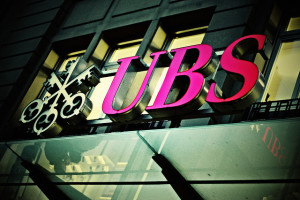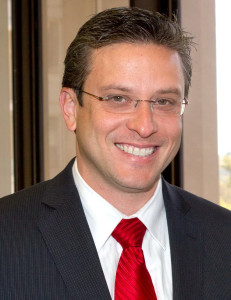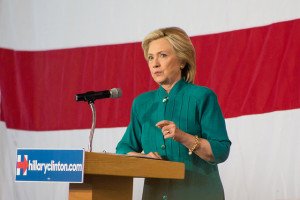By Peter Ward August 7, 2015
Trader Gets 14 Years for LIBOR Rigging

UBS ©Martin Abegglen
Tom Hayes, a former trader at UBS and Citigroup, was sentenced to 14 years in jail by a London court on Monday, for rigging the London Interbank Offered Rate (LIBOR), the global benchmark interest rate.
The LIBOR rate is the average cost of borrowing for banks and is used to price more than $350 trillion in financial products and loans. The rate is worked out quite simply—the cost of borrowing is taken from 16 global banks daily, and the average is calculated after discarding the top four and bottom four rates.
Prosecutors in Hayes’ case said he used a global network of 25 traders and brokers from at least 10 banks to manipulate the LIBOR rate on an industrial scale.
Hayes, first charged by U.S. officials in 2012, is the first person to stand trial for the scandal, but major banks have been hit with fines worth $9 billion by authorities. Deutsche Bank, UBS, Radobank and Barclays have all been handed penalties over the LIBOR manipulation.
Hayes earned UBS $310 million over four years while manipulating submissions to the yen LIBOR fixings, according to prosecutors. “He was the ringmaster at the very centre, telling others around him what to do and in a number of cases rewarding them for their dishonest assistance,” The Daily Telegraph reported prosecutor Mukul Chawla telling the London court.
Puerto Rico Defaults

Alejandro Garcia Padilla © Alejandro Garcia Padilla -cropped” by United Satates Department of Laborderivative work: Coronades (talk) – Secretary of Labor Hilda L. Solis meets with Senator Alejandro Garcia of Puerto Rico.jpg. Licensed under CC BY 2.0 via Wikimedia Commons.
Debt-ridden Puerto Rico missed a $58 million bond payment on Monday, raising fears that the island’s economy will face what Governor Garcia Padilla has referred to as a “death spiral” unless creditors agree to restructuring.
Puerto Rico did make a $628,000 payment for the interest on the debt, but said it did not have sufficient funds to pay the full amount. Padilla has warned that using more and more tax income to pay off debts rather than to fund public services will just cripple the economy further.
Puerto Rico, which is under the jurisdiction of the U.S. but is not a state, is struggling with debts in excess of $72 billion. This default was the territory’s first in 117 years.
Vox reports that Puerto Rico’s financial woes began in 2006, when the island lost its federal tax advantages as a location for U.S. companies to conduct business, which resulted in an exodus of businesses. This was followed by the financial crisis of 2007 and recession in 2009, which made investors wary of Puerto Rican bonds and hit the tourism industry hard. At the same time the workforce population has been declining steadily as Puerto Ricans move to mainland U.S., which drains productivity and hurts GDP.
Disney Slides on ESPN Fears

Disney CEO Bob Iger ©Thomas Hawk
Disney’s second quarter results spooked Wall Street investors, resulting in a 9% drop in the company’s shares on Wednesday. The company’s worst single-day performance in nearly four years was attributed to concerns over ESPN, Disney’s most profitable enterprise.
Prior to the fall, Disney was the best performer in the Dow this year, and the stock remains 20% up in 2015.
Disney CEO Bob Iger said there had been “some subscriber losses” at ESPN, amid wider fears of ‘cord cutting’ in the media industry. Cord cutting, or cord shaving, refers to households dropping or reducing cable packages, instead choosing online on-demand services for their video content.
“We are realists about the business and about the impact technology has had on how product is distributed, marketed and consumed,” Iger said in the company’s earnings call. “We are also quite mindful of potential trends among younger audiences.”
Disney’s problems were shared with other media companies this week, as Time Warner, Comcast and 21st Century Fox shares all dropped. Time Warner, which is home to HBO, CNN and the Warner Bros, film studios, reported an 8% rise in revenue in its second quarter results, but shares still slipped 9% on Tuesday.
New Rules on CEO Pay Disclosures
Publicly traded companies in the U.S. will now have to disclose how much their CEOs are paid compared to the rest of the workforce, after a vote on Wednesday by the Securities and Exchange Commission (SEC).
The ruling means public companies will need to provide a ratio of the CEO’s pay and the median pay of the rest of the company in filings with the regulator. The ruling will come into effect from 2017, and the decision has added fuel to the debate over pay inequality.
Those opposed have said it will be costly and difficult to implement.

Democrat presidential candidate Hillary Clinton. ©Gregory Hauenstein
“While there is no doubt that this information comes with a cost, the final rule recommended by the (SEC) staff provides companies with substantial flexibility in determining the pay ratio, while remaining true to the statutory requirements,” said SEC Chair Mary Jo White.
Pay equality is set to play a big role in Presidential elections next year. Democrat candidate Hillary Clinton recently said that the average CEO makes around 300 times what the average worker makes, according to The Guardian.
A Facebook post about the $15 an hour some “burger flippers” make written by a paramedic who makes the same wage recently went viral, demonstrating the interest in pay equality issues in the U.S. The paramedic, Jens Rushing, first described how difficult his job was, and how angry some people are that fast-food workers make the same. But he then went on to champion the fast food workers for demanding a living wage and to blast all the richly-paid CEOs who hoard company profits. The post has been shared over 42,000 times.
Netflix Announces Generous Parental Leave

Paternity leave ©
Steven Miller
Netflix announced on Tuesday it will allow its employees, male and female, up to one year of paid parental leave. The decision has caused wide ranging debate over the benefits and drawbacks of such a policy.
The Guardian produced an interesting graphic highlighting the number of weeks of paid leave currently on offer in the countries in which Netflix operates. Some of these countries, including almost the whole of South America, do not have any statutory parental leave. The U.S. gives new parents under 30 weeks but that leave is unpaid. Germany, France, Austria and Sweden offer the most parental leave.
In The Atlantic, a feature written by Rebecca Rosen explains how Netflix has far outstripped its technology sector counterparts in terms of paternal leave offered. Facebook offers four months of paid maternity leave, Google 18 weeks and Twitter 20 weeks. The article goes on cite experts who say that a year is considered to be the ideal amount of time for a mother or father to spend out of the workforce caring for a new child.
The Washington Post ran an article explaining why Netflix’s policy would be a bad idea for companies, arguing that most employees would not take off the full year and that it would cause huge logistical issues if they did.
The Netflix announcement does appear to have already made an impact on other companies. Microsoft revealed on Thursday it was extending its paternity leave to 20 week paid leave for mothers and 12 paid weeks for new fathers.
This entry was posted on Friday, August 7th, 2015 at 4:22 pm. It is filed under Week in Review and tagged with Disney and ESPN, Libor rigging scandal, Netflix parental leave, Puerto Rico debt, Puerto Rico default. You can follow any responses to this entry through the RSS 2.0 feed.
Comments are closed.
